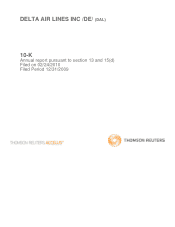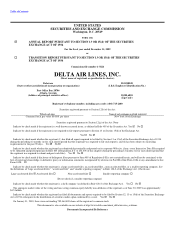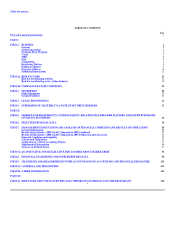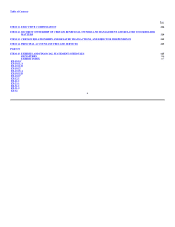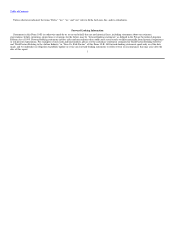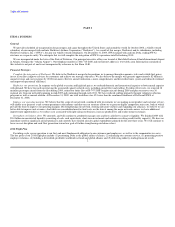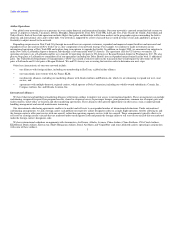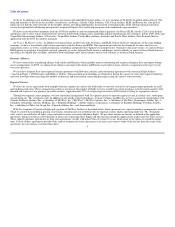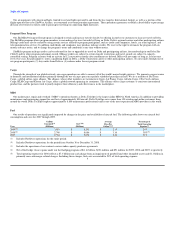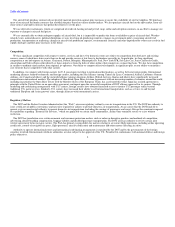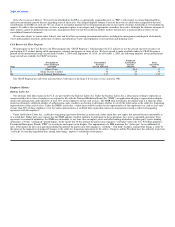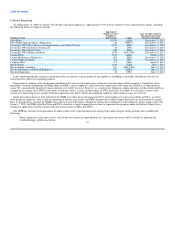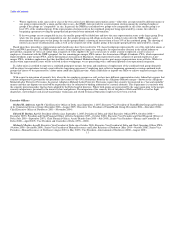Delta Airlines 2009 Annual Report Download - page 8
Download and view the complete annual report
Please find page 8 of the 2009 Delta Airlines annual report below. You can navigate through the pages in the report by either clicking on the pages listed below, or by using the keyword search tool below to find specific information within the annual report.
Table of Contents
Airline Operations
Our global route network gives us a presence in every major domestic and international market. Our route network is centered around the hub system we
operate at airports in Atlanta, Cincinnati, Detroit, Memphis, Minneapolis/St. Paul, New York-JFK, Salt Lake City, Paris-Charles de Gaulle, Amsterdam and
Tokyo-Narita. Each of these hub operations includes flights that gather and distribute traffic from markets in the geographic region surrounding the hub to
domestic and international cities and to other hubs. Our network is supported by a fleet of aircraft that is varied in terms of size and capabilities, giving us
flexibility to adjust aircraft to the network.
Expanding our presence in New York City through increased focus on corporate customers, expanded and improved airport facilities and increased and
expanded service into and out of New York City is a key component of our network strategy. For example, we continue to make investments in our
international operations at New York-JFK and explore long-term options to upgrade the facility. In addition, in August 2009, we announced our intention to
make New York's LaGuardia Airport a domestic hub through a slot transaction with US Airways. The agreement calls for US Airways to transfer 125
operating slot pairs to us at LaGuardia and for us to transfer 42 operating slot pairs to US Airways at Reagan National Airport in Washington, D.C. We also
plan to swap gates at LaGuardia to consolidate all of our operations (including the Delta Shuttle) into an expanded main terminal facility with 11 additional
gates. The United States Department of Transportation ("DOT") has issued a tentative order on the transaction that would require the divestiture of 20 slot
pairs at LaGuardia and 14 slot pairs at Reagan National. We and US Airways are reviewing the tentative order to determine our next steps.
Other key characteristics of our route network include:
• our alliances with foreign airlines, including our membership in SkyTeam, a global airline alliance;
• our transatlantic joint venture with Air France KLM;
• our domestic alliances, including our marketing alliance with Alaska Airlines and Horizon Air, which we are enhancing to expand our west coast
service; and
• agreements with multiple domestic regional carriers, which operate as Delta Connection, including our wholly-owned subsidiaries, Comair, Inc.,
Compass Airlines, Inc. and Mesaba Aviation, Inc.
International Alliances
We have bilateral and multilateral marketing alliances with foreign airlines to improve our access to international markets. These arrangements can include
codesharing, reciprocal frequent flyer program benefits, shared or reciprocal access to passenger lounges, joint promotions, common use of airport gates and
ticket counters, ticket office co-location and other marketing agreements. These alliances often present opportunities in other areas, such as airport ground
handling arrangements and aircraft maintenance insourcing.
Our international codesharing agreements enable us to market and sell seats to an expanded number of international destinations. Under international
codesharing arrangements, we and a foreign carrier each publish our respective airline designator codes on a single flight operation, thereby allowing us and
the foreign carrier to offer joint service with one aircraft, rather than operating separate services with two aircraft. These arrangements typically allow us to
sell seats on a foreign carrier's aircraft that are marketed under our designator code and permit the foreign airline to sell seats on our aircraft that are marketed
under the foreign carrier's designator code.
We have international codeshare arrangements with Aeromexico, Air France, Alitalia, Avianca, China Airlines, China Southern, CSA Czech Airlines,
KLM Royal Dutch Airlines, Korean Air, Malev Hungarian Airlines, Royal Air Maroc and Virgin Blue (and some affiliated carriers operating in conjunction
with some of these airlines). 3

